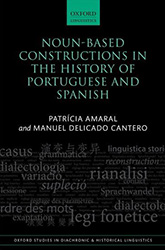This book explores syntactic and semantic change in three types of construction in Spanish and Portuguese: (i) complex determiner phrases with clausal adjunction (el hecho de, o facto de), (ii) complex prepositions/complementizers and complex connectives (sin embargo de/sem embargo de, so(b) pena de), and (iii) complex predicates containing light verbs (dar consejo/conselho de). While these constructions are syntactically different, they are all clause-taking complex expressions containing a noun followed by the functional preposition de ('of'). This book is the first work to use a systematic comparative corpus study to explore these expressions together; this approach allows individual changes to be distinguished from general changes, as well as emphasizing the chronological clustering of changes that involve complex constructions in both languages. By studying mechanisms of language change and their outcomes in two sister languages, Patrícia Amaral and Manuel Delicado Cantero address questions such as: How do complex constructions evolve? How does the meaning of the noun change when considered in isolation and when compared to the meaning of the whole construction? And how do syntactic categories change over time? This study of two closely-related languages reveals distinct developments occurring in parallel, and provides a crucial test case for theories of language change.
Noun-Based Constructions in the History of Portuguese and Spanish
Noun-Based Constructions in the History of Portuguese and Spanish
- Patrícia Amaral, Manuel Delicado Cantero
- Publication Date
2022 - Website
- Find out more
 The College of Arts
The College of Arts